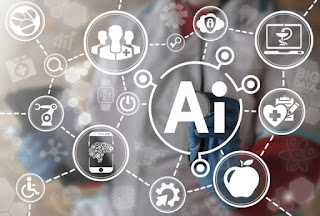The features of these supermachines include speech recognition, planning, reasoning, perception, and learning. These machines then have the ability to recognize problems and find the most applicable solution for each problem. Minor AI technologies have already been implemented in various sectors of our lives such as Apple’s Siri, Pandora, flying drones, etc.
Artificial Intelligence is yet to make its mega revolution in the healthcare sector. There are companies that are working on projects which can absolutely revolutionize the medical field!
Benefits of Artificial Intelligence in the Medical Field
 |
| Artificial Intelligence |
1. With the implementation of AI in medical areas, the mortality rate can decrease dramatically. Patients will no longer have to wait for specialists; as these machines will act as professional doctors. The machines will be designed to understand human emotions* with effective blood sample testing that produces results that are then fed into an AI that will then allow it to generate solutions to the medical illness of the patient.
2. Artificial Intelligence is expected to imitate the neural network of the brain. This will help in fast and accurate diagnostics. The machines will be able to diagnose a number of diseases by analyzing spectral information and diagnostic criteria. This can reach certain limits, as decision making is often a mix of science and art or guts, but will the AI be able to have this mix engraved in its algorithms?
3. Certain projects of AI will help people suffering from Neurocognitive disorders (NCDs), which is a mental problem. Therapeutic robots, which are a part of Artificial Intelligence, will assist in the therapy of these patients. The robots will reduce the patient’s reliance on nurses and doctors.
4. The future vision of Artificial Intelligence predicts a decline in the costs of medical care. Patients will be able to refer to online AI assistants simply by submitting their medical records. Costs of human errors in diagnosis, record keeping and visits to the doctor’s office will reduce.
One interesting potential aspect of using AI in the medical field is drug administration and dosage to patients, as in many cases patients have many diseases like cholesterol, high blood pressure, elevated liver enzymes and it is known that drugs used for reducing cholesterol levels affect liver enzymes. So using AI in reducing prescribing "contradicting" drugs might be a revolutionary scope to implement Artifical Intelligence in.
5. Medicine is now quite dependent on new studies, drug researchers and new information. Hence, AI is serviceable here as machines are more skilled and resilient at being able to keep up with analytical data interpretation better than the human mental ability.
Importance of Artificial Intelligence
The invention of AI will transform the world of medical science. Since predictions are important in this field, the use of these decision-making machines has been encouraged.
According to predictions, Artificial Intelligence might also replace jobs of certain doctors due to its high professional and accuracy level. The knowledge fed into the AI program’s database will be all the expertise and knowledge acquired from top doctors and medical experts. The AI assistant then will have the brain power of a large number of doctors from all around the world. Thus reducing the potential occurrence of medical errors and making sure of attaining best treatment and fastest recovery.
So are you in favor of integrating Artificial Intelligence in the medical field? do you think that it would kill the doctor/nurse job? or will Artificial Intelligence lead to creating more jobs?
* Understanding human emotions by AI is one the fields that are both promising but a little far-reaching in the near future, so do you agree that AI can be benifial in the medical industry?

No comments:
Post a Comment
We are happy that you want to comment, please note that your comment will be reviewed first before it is published.
If you like the article! You can share it with your friends and colleagues by pressing at social media buttons provided to the left of the page.
NO word verification or sign up is required!